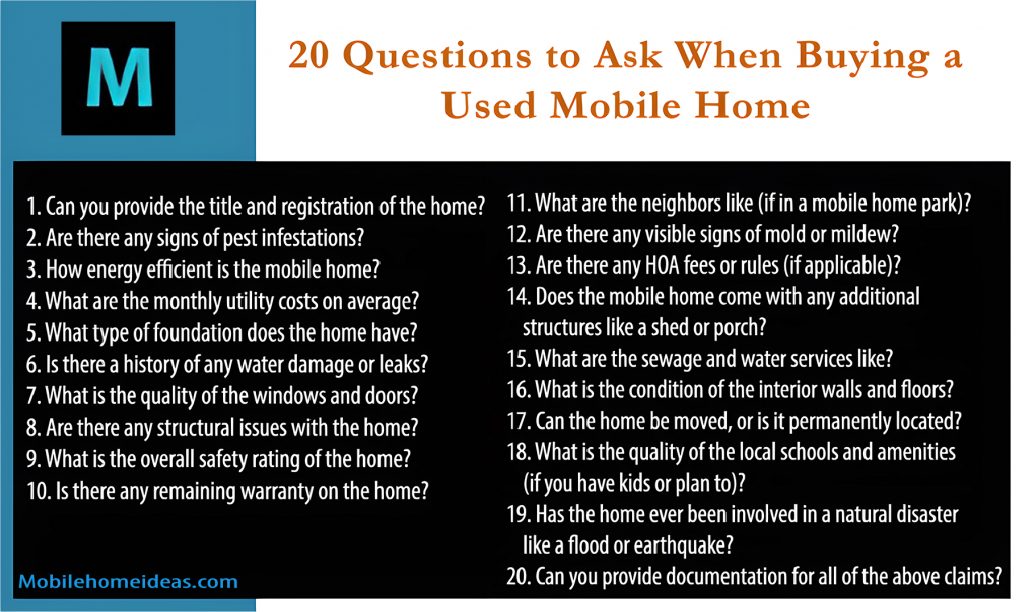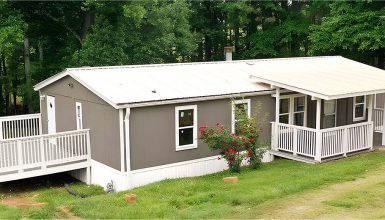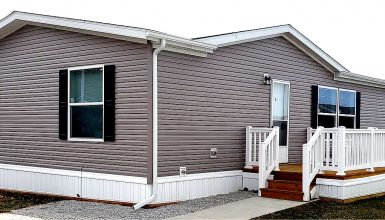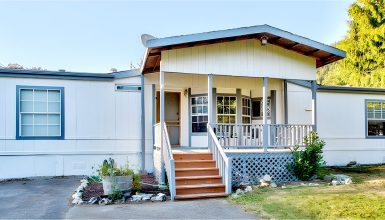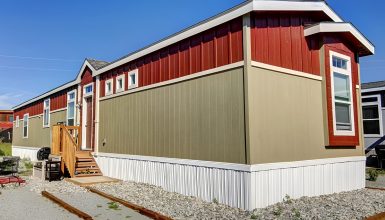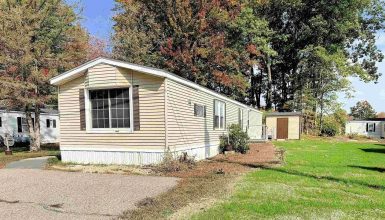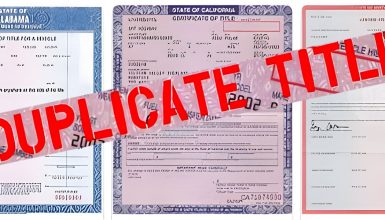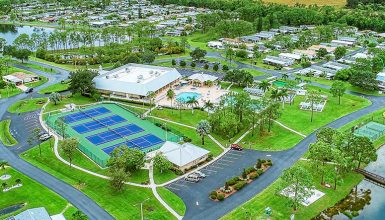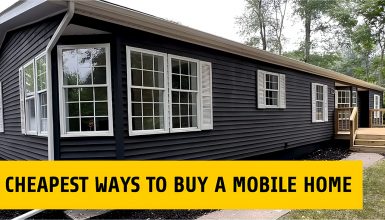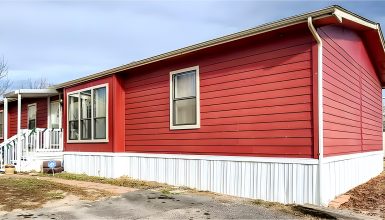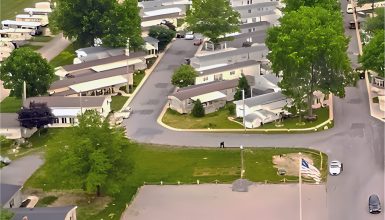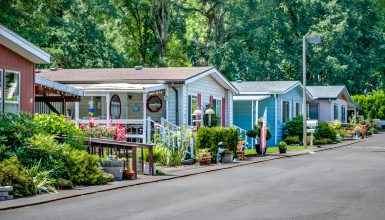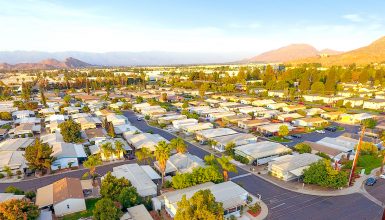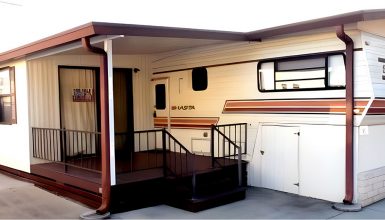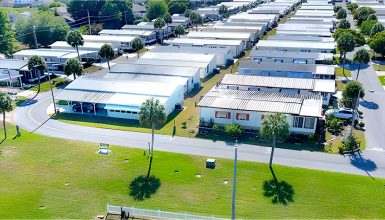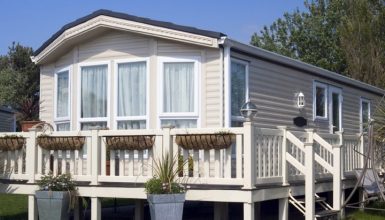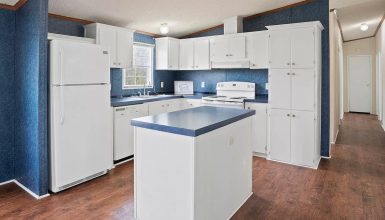Buying a used mobile home feels like a big adventure, and it is! But before diving headfirst into those homeownership waters, remember that knowledge is your life jacket. Why so? Because when it comes to buying a used mobile home, the more questions you ask, the better informed you’ll be.
Sure, that home may look picture-perfect outside, with its fresh paint and welcoming porch. But what about the plumbing? The roof? The heating and cooling system? Like an iceberg, what’s beneath the surface can be just as significant, if not more so.
20 Questions to Ask When Buying a Used Mobile Home
Here’s the real deal. Asking questions about these critical components, as well as about the mobile home’s history, financial aspects, and the local mobile home park, can save you from future headaches and unexpected costs. Plus, it’ll give you the peace of mind that comes with knowing you’ve made a sound investment. Here’s a list of questions to help guide you:
1. Can you provide the title and registration of the home?
So, think of the title and registration of a mobile home like the golden ticket in Charlie and the Chocolate Factory. This isn’t just a piece of paper – it’s your entry into the world of homeownership!
Here’s the deal. The title of a mobile home is proof that you own it, like your very own name tag that says, “This is mine.” Without it, well, you’re just a visitor.
Now let’s talk about the registration. Do you know labels on clothes that tell you how to wash them or what they’re made of? The registration is kind of like that. It’s the detailed scoop on your mobile home – who made it, when it was made, and other essential tidbits.
Here’s the bottom line: no title, no deal. It’s as simple as that. This isn’t some minor detail you can overlook. Without a title, you don’t own the home. It’s like trying to board a flight without a ticket. No title? No sale.
So when hunting for your perfect mobile home, remember to ask for the golden ticket – the title and registration. It’s your key to owning a mobile home and ensuring it’s everything you expect.
2. Are there any signs of pest infestations?
Imagine hosting a party, but some uninvited guests show up. I’m not talking about your friendly neighbor from down the street. I mean bugs and rodents. Yikes, right?
These tiny party crashers are more than just an ick factor. They’re the kind of guests who don’t just munch on your snacks, and they feast on your home. From gnawing away at wires to turning your structural beams into their buffet, these critters can do a real number on your home.
But it’s not just about the damage you can see. Oh no, these pests are like terrible magicians, doing their worst tricks behind the scenes. By the time you spot them, you might already have a real problem, and trust me, pest control costs are not the kind of expense you want to deal with unexpectedly.
So, when you’re eyeing that used mobile home remember to do some detective work. Ask about any history of pest infestations. It’s like checking the guest list of your home’s past parties. No one wants to deal with leftover mess from pests that partied too hard.
3. How energy efficient is the mobile home?
Let’s talk about energy efficiency, shall we? Picture this: you’ve got your dream mobile home. It’s cozy, cute, and fits your lifestyle like a glove. But when the first utility bill arrives, you’re left wondering if your perfect home is more of a money pit.
That’s where energy efficiency comes into play. It’s like your home’s personal fitness level, but instead of counting calories, it’s counting kilowatts.
An energy-efficient home knows how to work smarter, not harder. It keeps you cool in the summer and warm in the winter without breaking a sweat or, more importantly, breaking your budget. It’s the kind of home that keeps your comfort and bills low. Sounds good, right?
Now, I hear you asking, “How do I find this magical, money-saving home?” The answer is simple: ask. When you’re out there shopping for a used mobile home, put energy efficiency on your checklist. Ask about insulation, double-pane windows, and energy-star appliances. You name it.
Remember, an energy-efficient home isn’t just a nice-to-have; it’s a must-have. It’s the gift that keeps giving, saving you hard-earned dough month after month. So make sure your new home isn’t just pretty and efficient.
4. What are the monthly utility costs on average?
We all know the dread of opening a hefty utility bill. It’s like that suspenseful moment in a movie, right? You slowly open the envelope, bracing for the number that’ll make or break your monthly budget.
So, how do you dodge this horror film scenario when buying a mobile home? You play detective before you buy, that’s how!
See, your future home’s current owner has already been through all this. They’ve weathered the winters, sizzled through the summers, and every season. In other words, they’ve been collecting data on utility costs.
So, when eyeing that perfect mobile home, don’t forget to ask: “What’s the damage? How much do you usually pay for utilities each month?” Remember, it’s not just about the cost of the home itself but also the monthly operating costs that will be part of your life.
Their answer can give you a solid idea of what to expect. You’ll understand how energy efficient the home is and what monthly expenses you might face. It’s like getting a sneak preview of the sequel before it hits theaters!
5. What type of foundation does the home have?
Picture this: you’re building a sandcastle on the beach. You’ve got the bucket, the shovel, the whole shebang. But where do you start? The foundation, of course! Because without a good, solid base, your castle’s just a wave away from disaster.
The same goes for your potential mobile home. It’s not just about the pretty paint colors or the stylish kitchen. It’s what’s underneath that counts.
The foundation of a mobile home is its unsung hero. It’s the bedrock that keeps your home steady and robust, a bit like the best friend who’s always got your back. So when you’re in the market for a mobile home, asking about the foundation is a must. You’re looking for words like “sturdy,” “solid,” or “well-maintained.” If the foundation has issues, so does your potential home. We’re talking safety risks and repair costs, which no one wants in their life.
So don’t be shy about asking, “What type of foundation does the home have?” You’re not being nosy. You’re being smart. Because when it comes to your home, stability is everything.
6. Is there a history of any water damage or leaks?
Water damage or leaks in a mobile home seem small but can cause a ruckus. You see, water is a home’s worst enemy. Left unchecked, it can lead to big problems like mold and rot. These aren’t just unsightly – they can be seriously costly to fix.
But how do you spot water damage or leaks? It’s all about playing detective. Look for water stains on the ceilings and walls. Check under sinks and around appliances. If there’s any sign of dampness or moldy smells, it’s a red flag.
Don’t be afraid to ask the seller outright: “Has there been any water damage or leaks?” Their answer can be the difference between finding your dream home and stepping into a money pit.
Remember, a good home is a dry home. By checking for water damage up front, you’re ensuring your new home won’t become a DIY nightmare. You’re protecting your investment and, more importantly, your peace of mind.
7. What is the quality of the windows and doors?
Think of windows and doors like the loyal sentinels of your mobile home. They stand guard against the weather, noise, and even unwanted intruders. A high-quality window can keep your home cool in the summer and warm in the winter, cutting down on those pesky energy bills. And a sturdy door? That’s your security guard.
But how do you know if your potential new home has quality windows and doors? Give them a little test run. Do the windows open and close smoothly? Is there any draft coming through? Check the doors too. Do they close securely? Do they have strong locks?
Don’t be shy about asking the seller, “Can you tell me about the windows and doors?” They’re crucial to your home’s comfort, energy efficiency, and security.
Remember, windows and doors aren’t just about the view or the entrance. They’re your first line of defense against the outside world. And in your new home, you deserve to be comfortable, efficient, and safe.
8. Are there any structural issues with the home?
Imagine you’re buying a used car. You wouldn’t just look at the shiny paint job, would you? Of course not! You’d pop the hood, check the engine, and maybe even get a mechanic to look. Because what’s under the hood is what really matters.
Now apply that logic to buying a mobile home. Sure, that kitchen may look like a chef’s dream, but what about the home’s structure? This is like the skeleton of your home. It holds everything together, and if it’s shaky or weak, let’s just say things could come tumbling down.
So, don’t just look at the surface when touring a potential new home. Ask about the structure. Are there any issues? Has the home settled a lot? Are the floors even? Is there any sagging or cracking that could indicate a structural issue?
A shaky structure isn’t just an inconvenience. It’s a safety risk, and it can seriously impact the value of your investment. A home with structural issues is like a car with a faulty engine – it’s just a matter of time before you’re stuck with a breakdown. So, don’t be shy about this. Ask the tough questions, get a professional inspection if you can, and ensure your potential new home isn’t just pretty – make sure it’s solid.
9. What is the overall safety rating of the home?
Picture this: you’re curled up on the couch with a hot cup of tea and your favorite book. Outside, it’s pouring rain, but inside, you’re snug as a bug. This is the feeling of home, right? It’s that warm, cozy feeling of being safe and protected.
Now, let’s say you’re shopping for a mobile home. It’s not just about how the kitchen looks or if the bedroom is big enough. It’s about that feeling of safety, of knowing that your home is your safe haven, no matter what.
That’s where the safety rating comes in. This isn’t some boring number on a piece of paper. This seal of approval says, “This home is safe.”
But what makes a safe home? Think about solid structure, sound electrical and plumbing systems, safe heating, cooling, etc. The safety rating takes all of this into account and more.
So when you’re home shopping, ask, “What’s the safety rating?” It’s one of the most important questions you can ask because a home is more than a place to live. It’s a place to feel safe and secure.
10. Is there any remaining warranty on the home?
Imagine you’ve just bought a brand-new toaster. You’re toasting your bread one morning, and suddenly – poof! – it stops working. Now what? If you have a warranty, no sweat! It’s got your back, covering the repair or replacement costs.
Now, think about your mobile home. It’s not so different from the toaster, just a little bigger and much more expensive. That’s where a remaining warranty comes in handy. It’s your safety net for any unexpected repairs that might pop up.
Like a good friend who’s always there for you, a warranty can save the day when things go wrong. Maybe the heating system breaks down, or there’s a problem with the roof. You could be looking at little to no cost if there’s a warranty. And that’s a big win for your budget!
So when you’re touring a potential new home, make sure to ask, “Is there a remaining warranty?” It might not seem like a big deal initially, but it can be a lifesaver.
11. What are the neighbors like (if in a mobile home park)?
Do you know how in all the best sitcoms, the neighbors are constantly popping over for a chat, a cup of sugar, or some friendly advice? That’s the ideal, right? A neighborhood where everyone’s friendly, welcoming, and there for each other.
But here’s the thing: when you’re buying a mobile home, it’s not just about the home itself. It’s also about the neighborhood. Who are your neighbors? Are they quiet or loud? Do they take care of their homes? Do they seem friendly? You’ll want to know these things because, like it or not, neighbors can make or break your living experience.
Think of it like this: your home is like your castle, and your neighbors are like the rest of the kingdom. If the kingdom’s peaceful and prosperous, the castle’s a much nicer place to live.
So when you’re checking out a potential new home, take a little time to check out the neighborhood too. Maybe take a walk around the block, and say hi to anyone you see. And don’t be shy about asking the seller about the neighbors. They’ve lived there, and they’ll know the vibe.
12. Are there any visible signs of mold or mildew?
Mold and mildew aren’t just unsightly and smelly; they’re also potentially dangerous to your health and wallet. They can cause all sorts of problems, from allergies and respiratory issues to structural damage to your home. And getting rid of them? That can cost a pretty penny.
So when looking at a mobile home, it’s crucial to check for signs of mold and mildew. You’ll want to look out for discolored patches on walls, floors, or ceilings, and don’t forget to use your nose – that musty smell is a dead giveaway.
Ask the seller, too: “Has there been any mold or mildew in the home?” It’s a simple question, but it can save you a lot of hassle.
13. Are there any HOA fees or rules (if applicable)?
HOAs are like the captains of your neighborhood team. They make sure everything runs smoothly, from maintaining common areas to enforcing rules that keep the neighborhood looking good. But all that work isn’t free. That’s where HOA fees come in.
Now, these fees can vary a lot. Some might be a small monthly amount, and others could be a hefty lump sum each year. And those fees go towards things like landscaping, maintenance, and any amenities like a community pool or gym.
Then there are the rules. Maybe you can’t paint your front door a certain color, or you’re not allowed to have pets. These rules help keep the neighborhood harmonious and preserve property values. Still, they might also limit what you can do with your own home.
So when looking at a potential new mobile home, ask about the HOA. What are the fees? What do they cover? And what are the rules? It’s better to know upfront than be surprised later on. Remember, buying a home means joining a community. And just like any community, there might be some dues to pay and rules to follow. So make sure you’re in the know before you sign on the dotted line.
14. Does the mobile home come with any additional structures like a shed or porch?
When you’re buying a mobile home, it’s not just the home itself you should consider. It’s also those bonuses like sheds, porches, or carports. They’re like the cherry on top of your sundae, the bow on your present. They add value, functionality, and even a bit of charm to your potential new home.
Think about it. A shed can offer extra storage, a place for hobbies, or even a cool clubhouse for the kids. A porch can provide a space for relaxation, socializing, or just enjoying the great outdoors. A carport can protect your car from harsh weather, saving you time and money in the long run.
So, when touring a mobile home, look for these additional structures. Ask the seller about them. Are they included in the sale? What’s their condition? You’d be amazed that they can make a difference in your living experience.
15. What are the sewage and water services like?
Sewage and water services might not be glamorous in home buying, but they’re essential. Think about it – from cooking to cleaning, showering to flushing, we rely on these services daily.
When they’re working flawlessly, you hardly notice them. But when they’re not, let’s just say it can get messy. And nobody wants to deal with that in their new home.
So when you’re checking out a potential mobile home, don’t forget to ask about the sewage and water services. Are they reliable? Are there any ongoing issues? What are the costs associated with them? Don’t be shy about asking these questions. Remember, this is your future home we’re talking about. You have every right to know what you’re getting into.
16. What is the condition of the interior walls and floors?
The interior walls and floors aren’t just about looks; they’re about functionality, too. They’re the stage for your life, the backdrop for your memories. They should be solid, safe, and well-maintained.
Think of it this way: imagine you’re moving a heavy piece of furniture, and suddenly, your foot goes through the floor. Or maybe you’re hanging a picture, and the wall crumbles under your drill. Not exactly the dream home experience, right?
That’s why it’s essential to check the condition of the interior walls and floors when looking at a mobile home. Are the floors solid and even? Are the walls free of cracks or holes? Do they need any major repairs?
Don’t be afraid to ask these questions. Yes, they might not be as exciting as choosing paint colors or planning your furniture layout, but trust me, they’re just as important.
17. Can the home be moved, or is it permanently located?
Here’s the thing about mobile homes: despite their name, some aren’t so mobile. They might have been designed to move, but over time, they might not be ready to hit the road again due to various factors like renovations, additions, or even their age.
So, if you’re dreaming of a home that can move with you, you’ve got to ask the question: is this home actually mobile? Can it be moved easily, or would it require a major operation (and expense)? So don’t be shy. Ask the seller about the home’s mobility.
18. What is the quality of the local schools and amenities (if you have kids or plan to)?
A home isn’t just about the four walls and the roof. It’s about the community around it. It’s about the schools where your kids learn, the parks where you jog, the restaurants where you have family dinners. These things are just as crucial in shaping your living experience.
Think about it – do you have kids or plan to? Then local schools are a big deal. You want them to get an excellent education in a safe, nurturing environment. Asking about the local schools isn’t just about academics – it’s about your children’s future.
And it’s not just about schools. What about other amenities? Is there a hospital nearby? How about a park or a grocery store? Can you grab a coffee or enjoy a meal without driving for miles?
These questions might seem small, but they add up. They’re the little details that make a house a home, a community, a neighborhood.
So when you’re checking out a mobile home, don’t forget to check the surrounding area. Ask about the schools, the amenities, the services. It’s not just about finding a great home – it’s about finding a great life.
19. Has the home ever been involved in a natural disaster like a flood or earthquake?
Here’s a not-so-fun fact: natural disasters can do a number on a home. We’re talking floods, earthquakes, hurricanes – they can cause damage that’s not just serious but also sneaky. Damage that might not be visible at first glance.
Picture this: you find a mobile home that seems perfect. It’s beautiful, and it’s in your budget. And everything you’ve been dreaming of. Then, after you’ve moved in, you discover it was once caught in a flood. Slowly but surely, signs of water damage appear – a musty smell here, a discolored wall there. Before you know it, you’ve got a big problem on your hands.
That’s why asking about a home’s natural disaster history is crucial. Has it been through a flood, an earthquake, a hurricane? If so, was it adequately repaired afterward? It might be an uncomfortable conversation, but believe me. It’s worth it.
So when looking at mobile homes, ask about their past, not just the renovations or repairs. But also any battles they might have had with Mother Nature. It might save you a lot of hassle – and a lot of money – down the line.
20. Can you provide documentation for all of the above claims?
Lastly, let’s dive into the oh-so-important world of documentation. Ever heard the phrase “Trust, but verify”? It’s a wise saying that holds particularly true when buying a home. The seller may tell you everything’s hunky-dory, but it’s just words without documentation.
Imagine you’re checking out a mobile home, and the seller says: the roof was just replaced last year. That sounds great, right? A new roof means less hassle for you. But hold on – where’s the proof? Without the paperwork, you’re just taking their word for it. And in the world of real estate, that’s not a gamble you want to take.
So, when inspecting mobile homes and asking questions, don’t forget to ask for documents. It might feel like being a detective, but this is your future home we’re talking about!
Conclusion
The more information you gather, the more precise your picture becomes. And the clearer your picture, the wiser your decision will be. Remember, each question you ask brings you closer to finding a place you can truly call home. So, keep the faith, keep asking, and keep dreaming. Your perfect mobile home is out there, waiting for you to find it.

